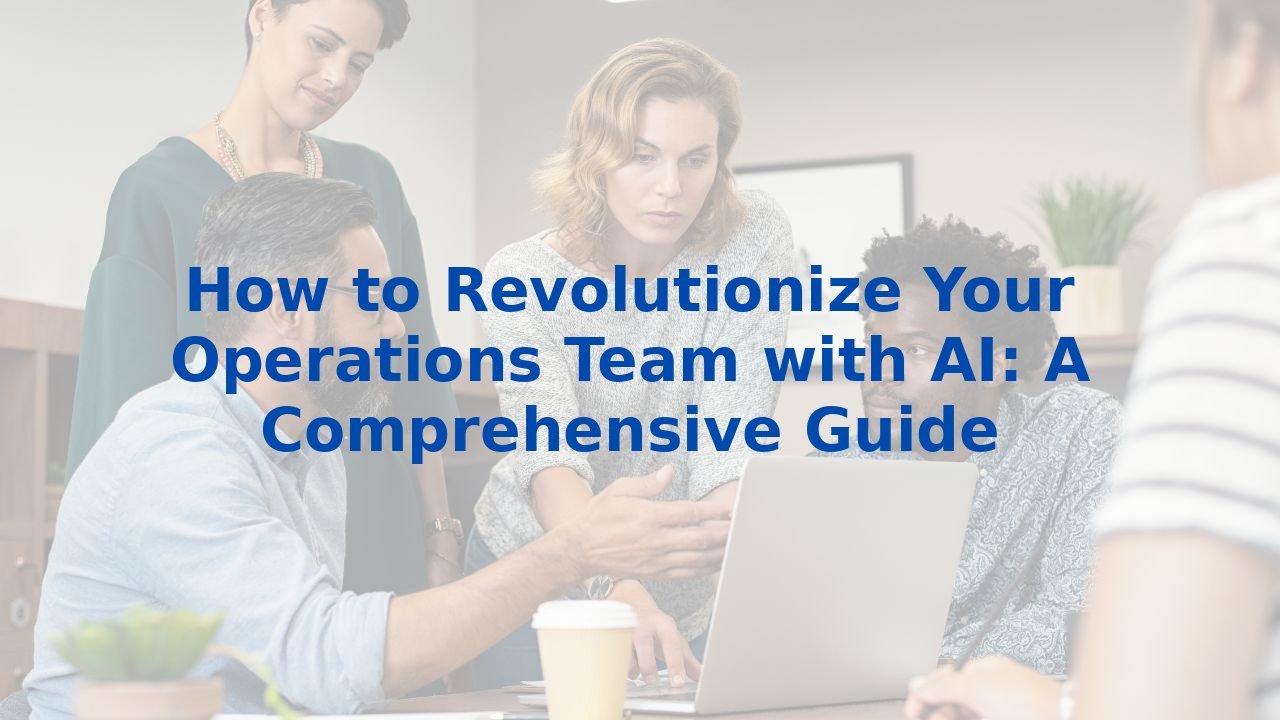How to Revolutionize Your Operations Team with AI: A Comprehensive Guide
How to Revolutionize Your Operations Team with AI: A Comprehensive Guide
In today's fast-paced business environment, operational efficiency is not just an objective; it is a necessity for survival. At the heart of this efficiency lies your Operations team, ensuring that every cog in the wheel functions smoothly—from managing inventory to fulfilling orders. When powered by Artificial Intelligence (AI), these processes undergo a transformation, significantly elevating productivity and performance. Let's explore how AI can revolutionize your operational workflows and why employee training is crucial to maximize these benefits.
1. Automation of Repetitive Tasks
Imagine a world where repetitive tasks are handled without human intervention, freeing your team to focus on higher-level strategic initiatives. AI achieves this through automation. By leveraging AI technologies, businesses can automate mundane tasks such as data entry, scheduling, and customer inquiries via chatbots. This not only saves precious time but also minimizes human errors that could otherwise lead to costly setbacks. With employees freed from the shackles of repetitive duties, they can unleash their creativity on projects that drive innovation and growth.
2. Data-Driven Decision Making
Data is the new oil; it propels decision-making in ways we are just beginning to understand. AI's analytical prowess allows organizations to sift through enormous datasets with unprecedented speed and accuracy. This capability is invaluable across multiple sectors. For example, in supply chain management, AI can optimize logistics and inventory control, ensuring products are delivered efficiently and customers stay satisfied. The result? Your operations become more agile, and your decision-making becomes sharper and more strategic.
3. Predictive Maintenance and Quality Control
Breakdowns can cost millions, both in lost revenue and diminished reputation. This is where AI shines through predictive maintenance. By anticipating equipment failures before they happen, AI helps reduce downtime and the costs associated with repairs. Furthermore, AI-driven analytics can enhance quality control in manufacturing processes, spotting potential issues before they escalate into larger problems. By keeping production schedules on track and resource allocation precise, businesses can eliminate waste and optimize efficiency.
4. Enhanced Customer Experience
A satisfied customer is the best business strategy. AI enhances customer interactions by personalizing recommendations based on individual behavior. By analyzing customer data, AI tailors offerings that resonate with varying tastes and preferences, ultimately boosting engagement, satisfaction, and loyalty. This level of personalization transforms the customer experience, making every interaction more meaningful and impactful, thereby strengthening your brand in the competitive marketplace.
5. Improved Resource Management
In the realm of project management, AI’s ability to analyze data can optimize resource distribution. By aiding in planning and scheduling tasks, AI ensures that every resource is utilized effectively, resulting in timely project completion without unnecessary expenditure. Efficient resource management not only streamlines operations but also drives overall business performance and contributes to achieving organizational objectives.
6. Risk Management and Resilience
Every business faces risks, but with the right tools, they can be managed proactively. AI plays a pivotal role in risk mitigation by identifying potential threats before they materialize. Whether in cybersecurity, where AI detects unusual activities signaling possible breaches, or in finance, where it identifies risks and opportunities, AI enables organizations to approach decision-making with informed caution. Proactive risk management maintains smooth operations, preparing businesses for potential disruptions while safeguarding their assets.
The Importance of Employee Training
While AI clearly enhances operational efficiency, the human element remains equally vital. Training employees to collaborate effectively with AI technologies leads to numerous benefits:
- Adoption and Integration: Well-trained employees can seamlessly incorporate AI into their workflows, ensuring that the organization fully reaps the advantages of automation and data-driven insights.
- Skill Development: Employee training empowers staff with essential skills such as data analysis, enabling them to harness AI insights optimally.
- Error Reduction: Understanding AI systems allows employees to minimize mistakes and execute AI-driven processes with confidence.
- Strategic Focus: Armed with AI capabilities, trained employees can devote more time to strategic planning and problem-solving, crucial elements for long-term success.
Conclusion
The integration of AI into operational processes represents a transformative opportunity for businesses. By automating repetitive tasks, enhancing data-driven decisions, improving predictive maintenance, and elevating customer experiences, AI significantly boosts operational efficiency. However, to maximize these rewards, organizations must invest in training their employees to work effectively with AI technologies. This dual approach—leveraging AI while focusing on human capital—can set the stage for unparalleled efficiency and performance in the evolving market landscape. In this age of technology, AI is more than a tool; it is a strategic partner ready to revolutionize how businesses operate.



